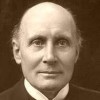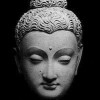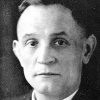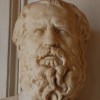It amazes me that people understand what it means to line up to get a driver’s license renewed or convince the city to enforce a no parking zone but still attribute divine competence to the CIA, FBI or their equivalents in the UK or elsewhere. They may be spooks but they are still civil servants working in massive government bureaucracies. I imagine that for many people it is more comforting to believe a malevolent force is running the show than face the fact that most of the time nobody knows with much certainty what the heck is going on.
Nicholas Packwood (contemp.) Canadian essayist and academic
Ghost of a Flea, “Conspiracy” (17 May 2004)
http://www.ghostofaflea.com/archives/002160.html
Those who “abjure” violence can only do so because others are committing violence on their behalf.
George Orwell (1903-1950) English writer [pseud. of Eric Arthur Blair]
“Notes on Nationalism” Polemic, (Oct. 1945)
Source essay. Commonly misquoted as "People sleep peaceably in their beds at night only because rough men stand ready to do violence on their behalf." This is not found in Orwell's works, but was a paraphrase of this and other Orwell writings by Richard Grenier, "Perils of Passive Sex," Washington Times (6 Apr 1973). See here for more information.
TIMON: ‘Tis not enough to help the feeble up,
But to support him after.William Shakespeare (1564-1616) English dramatist and poet
Timon of Athens, Act 1, sc. 1, l. 107ff (1.1.107-108) (1606) [with Thomas Middleton]
(Source)
TOUCHSTONE: I do now remember a saying, “The fool doth think he is wise, but the wise man knows himself to be a fool.”
William Shakespeare (1564-1616) English dramatist and poet
As You Like It, Act 5, sc. 1, l. 30ff (5.1.30-32) (1599)
(Source)
POET: The fire i’the flint
Shows not till it be struck.William Shakespeare (1564-1616) English dramatist and poet
Timon of Athens, Act 1, sc. 1, l. 28ff (1.1.28-29) (1606) [with Thomas Middleton]
(Source)
THERSITES: The devil Luxury, with his fat rump and potato finger …
William Shakespeare (1564-1616) English dramatist and poet
Troilus and Cressida, Act 5, sc. 2, l. 66 (5.2.66) (1602)
(Source)
IAGO: Pleasure and action make the hours seem short.
William Shakespeare (1564-1616) English dramatist and poet
Othello, Act 2, sc. 3, l. 400 (2.3.400) (1603)
(Source)
FALSTAFF: Lord, Lord, how this world is given to lying!
William Shakespeare (1564-1616) English dramatist and poet
Henry IV, Part 1, Act 5, sc. 4, l. 148 (5.4.148) (1597)
(Source)
ISABELLA:Truth is truth
To the very end of reckoning.William Shakespeare (1564-1616) English dramatist and poet
Measure for Measure, Act 5, sc. 1, l. 51ff (5.1.51-52) (1604)
(Source)
ROMEO: Sleep dwell upon thine eyes, peace in thy breast.
William Shakespeare (1564-1616) English dramatist and poet
Romeo and Juliet, Act 2, sc. 2, l. 202 (2.2.202) (c. 1594)
(Source)
PEMBROKE: And oftentimes excusing of a fault
Doth make the fault the worse by th’ excuse,
As patches set upon a little breach
Discredit more in hiding of the fault
Than did the fault before it was so patched.William Shakespeare (1564-1616) English dramatist and poet
King John, Act 4, sc. 2, l. 30ff (4.2.30-34) (1596)
(Source)
I demand to know how much longer the so-called “authorities” intend to continue ignoring the international spate of alarming incidents involving bosoms.
At this point you’re thinking: “WHAT international spate of alarming incidents involving bosoms?” Unless, of course, you’re a man, in which case you’re thinking only: “Bosoms!” The male brain has an entire lobe devoted to this topic.
SHEPHERD’S SON: He seems to be of
great authority. Close with him, give him gold; and
though authority be a stubborn bear, yet he is oft
led by the nose with gold.William Shakespeare (1564-1616) English dramatist and poet
Winter’s Tale, Act 4, sc. 4, l. 932ff (4.4.932-935) (1611)
(Source)
Fellowship in woe doth woe assuage.
And thou wilt give thyself relief if thou doest every act of thy life as if it were the last, laying aside all carelessness and passionate aversion from the commands of reason, and all hypocrisy, and self-love, and discontent with the portion which has been given to thee.
Marcus Aurelius (AD 121-180) Roman emperor (161-180), Stoic philosopher
Meditations, Book 2, #5 [tr. Long (1862)]
(Source)
Usually modernized, "And you will give yourself relief, if you do every act of your life as if it were the last, laying aside all carelessness and passionate aversion from the commands of reason, and all hypocrisy, and self-love, and discontent with the portion which has been given to you," and the source of the more common (and mixed-message) reduction of this aphorism, "Do every act of your life as if it were your last."
Alternate translations:
Go about every action as thy last action, free from all vanity, all passionate and wilful aberration from reason, and from all hypocrisy, and self-love, and dislike of those things, which by the fates or appointment of God have happened unto thee.
[tr. Casaubon (1634), #2]
Perform every action as if it were your last; if your appetites and passions do not cross upon your reason; if you keep clear of rashness, and have nothing of insincerity and self-love to infect you, and do not complain of your destiny.
[tr. Zimmern (1887)]
Do each act as though it were your last, freed from every random aim, from wilful turning away from the directing Reason, from pretence, self-love and displeasure with what is allotted to you.
[tr. Farquharson (1944)]
Approach each action as though it were your last, dismissing the wayward thought, the emotional recoil from the commands of reason, the desire to create an impression, the admiration of self, the discontent with your lot.
[tr. Staniforth (1964)]
Perform every action in your life as if it were your last, putting aside all aimlessness and emotional resistance to the choices of reason, and all pretense, selfishness, and discontent with what has been allotted to you.
[tr. Needleman/Piazza (2008)]
The man of honor thinks of his character, the inferior man of his position. The man of honor desires justice, the inferior man favor.
[君子懷德、小人懷土、君子懷刑、小人懷惠。]
Confucius (c. 551- c. 479 BC) Chinese philosopher, sage, politician [孔夫子 (Kǒng Fūzǐ, K'ung Fu-tzu, K'ung Fu Tse), 孔子 (Kǒngzǐ, Chungni), 孔丘 (Kǒng Qiū, K'ung Ch'iu)]
The Analects [論語, 论语, Lúnyǔ], Book 4, verse 11 (4.11) (6th C. BC – AD 3rd C.) [tr. Soothill (1910)]
(Source)
(Source (Chinese)). Alternate translations:
The superior man thinks of virtue; the small man thinks of comfort. The superior man thinks of the sanctions of law; the small man thinks of favours which he may receive.
[tr. Legge (1861)]
The masterly man has an eye to virtue, the common man, to earthly things; the former has an eye to penalties (for error), the latter, to favour.
[tr. Jennings (1895)]
A wise man regards the moral worth of a man; a fool, only his position. A wise man expects justice; a fool expects favours.
[tr. Ku Hung-Ming (1898)]
The proper man is concerned with examining his consciousness and acting on it, the small man is concerned about land; the superior man about legality, the small man about favors.
[tr. Pound (1933)]
Where gentlemen set their hearts upon moral force (tê), the commoners set theirs upon the soil. Where gentlemen think only of punishments, the commoners think only of exceptions.
[tr. Waley (1938)]
The perfect gentleman cherishes high moral conduct; the mean man, well-being. The perfect gentleman cherishes the penal code; the mean man, ex¬ emptions therefrom.
[tr. Ware (1950)]
While the gentleman cherishes benign rule, the small man cherishes his native land. While the gentleman cherishes a respect for the law, the small man cherishes generous treatment.
[tr. Lau (1979)]
The gentleman cherishes virtue, but the small man cherishes the soil; the gentleman cherishes the rigors of the law, but the small man cherishes leniency.
[tr. Dawson (1993)]
A gentleman seeks virtue; a small man seeks land. A gentleman seeks justice; a small man seeks favors.
[tr. Leys (1997)]
The gentleman cherishes virtue; the small man cherishes land. The gentleman cherishes institutions; the small man cherishes favors.
[tr. Huang (1997)]
The gentlemen are concerned about the virtuousness; the mean persons are concerned about the land. The gentlemen are concerned about the status; the mean persons are concerned about the benefit.
[tr. Cai/Yu (1998), #77]
Exemplary persons (junzi) cherish their excellence; petty persons cherish their land. Exemplary persons cherish fairness; petty persons cherish the thought of gain.
[tr. Ames/Rosemont (1998)]
The gentleman likes virtue; the little man likes partiality. The gentleman likes justice; the little man likes mercy.
[tr. Brooks/Brooks (1998)]
while the noble-minded cherish integrity, little people cherish territory. And while the noble-minded cherish laws, little people cherish privilege.
[tr. Hinton (1998)]
The gentleman cherishes virtue, whereas the petty person cherishes physical possessions. The gentleman thinks about punishments, whereas the petty person thinks about exemptions.
[tr. Slingerland (2003)]
The gentleman has his mind fixed on virtue; the petty man has his mind fixed on land. The gentleman has his mind fixed on penalties; the petty man has his mind fixed on bounty.
[tr. Watson (2007)]
The gentleman [junzi] worries about the condition of his moral character, while the common man [xiaoren] worries about [whether he can hold on to] his land. The gentleman is conscious of [not breaking] the law, while the common man is conscious of what benefits he might reap [from the state].
[tr. Chin (2014)]
A Jun Zi cares about virtuous and righteous principles, whereas a Xiao Ren cares about worldly matters. A Jun Zi cares about rules and discipline, whereas a Xiao Ren cares about benefits.
[tr. Li (2020)]
The superior man seeks what is right; the inferior one, what is profitable.
[Source]
ISABELLA:O, it is excellent
To have a giant’s strength, but it is tyrannous
To use it like a giant.William Shakespeare (1564-1616) English dramatist and poet
Measure for Measure, Act 2, sc. 2, l. 135ff (2.2.135-137) (1604)
(Source)
IAGO: Our bodies are our gardens, to the which our wills are gardeners.
William Shakespeare (1564-1616) English dramatist and poet
Othello, Act 1, sc. 3, l. 362ff (1.3.362-363) (1603)
(Source)
He who knows the Truth is not equal to him who loves it, and he who loves it is not equal to him who delights in it.
[知之者、不如好之者、好之者、不如樂之者]
Confucius (c. 551- c. 479 BC) Chinese philosopher, sage, politician [孔夫子 (Kǒng Fūzǐ, K'ung Fu-tzu, K'ung Fu Tse), 孔子 (Kǒngzǐ, Chungni), 孔丘 (Kǒng Qiū, K'ung Ch'iu)]
The Analects [論語, 论语, Lúnyǔ], Book 6, verse 20 (6.20) (6th C. BC – 3rd C. AD) [tr. Soothill (1910), 6.18]
(Source)
Earlier translations use Legge's verse numbering, 6.18. The source material uses 之 (zhi, "it") without a clear antecedent. Soothill suggests it may refer to Truth, Virtue, or the Right. Some translations provide what they think is the reference; others leave it ambiguous or footnote it, as shown below.
(Source (Chinese)). Alternate translations:
They who know the truth are not equal to those who love it, and they who love it are not equal to those who delight in it.
[tr. Legge (1861), 6.18]
They who know it are not as those who love it, nor they who love it as those who rejoice in it.
[tr. Jennings (1895), 6.18]
Those who know it are not as those who love it; those who love it are not as those who find their joy in it.
[tr. Ku Hung-Ming (1898), 6.18]
Those who know aren't up to those who love; nor those who love, to those who delight in.
[tr. Pound (1933), 6.18]
To prefer it is better than only to know it. To delight in it is better than merely to prefer it.
[tr. Waley (1938), 6.18; "the Way"]
The man who loves truth (or learning) is better than the man who knows it, and the man who finds happiness in it is better than the man who loves it.
[tr. Lin Yutang (1938)]
Being fond of The Right Way is better than just knowing it; and taking one’s delight in it is better than just being fond of it.
[tr. Ware (1950)]
To be fond of something is better than merely to know it, and to find joy in it is better than merely to be fond of it.
[tr. Lau (1979), 6.20]
Those who understand a thing are not equal to those who are fond of it, and those who are fond of it are not equal to those who delight in it.
[tr. Dawson (1993), 6.20]
To know something is not as good as loving it; to love something is not as good as rejoicing in it.
[tr. Leys (1997), 6.20]
Those who know it are not comparable to those who love it; those who love it are not comparable to thsoe who delight in it.
[tr. Huang (1997)]
The persons who know something are not better than the persons who favor something; The persons who favor something are not better than the persons who enjoy something.
[tr. Cai/Yu (1998), 6.20, #140]
To truly love it is better than just to understand it, and to enjoy it is better than simply to love it.
[tr. Ames/Rosemont (1998), 6.20; "knowledge and learning"]
Knowing it is not as good as loving it; loving it is not as good as taking delight in it.
[tr. Brooks/Brooks (1998), 6.20; virtue]
To understand something is nothing like loving it. And to love something is nothing like delighting in it.
[tr. Hinton (1998), 6.19]
To know it is not as good as to approve it. To approve it is not as good as to find joy in it.
[tr. Watson (2007), 6.20]
To know something is not as good as to have a love for it. To have a love for something is not as good as to find joy in it.
[tr. Annping Chin (2014), 6.20; learning, cf. 6.11 and 7.19]
Learned people are inferior to those who are eager to learn. Those who are eager to learn are inferior to those who enjoy learning.
[tr. Li (2020), 6.20]
Better than the one who knows what is right is he who loves what is right.
[Common English translation]
What is meant … By the term “illusion” is that phenomena do not exist independently of other phenomena, that their appearance of independent existence is illusory. This is all that is meant by “illusion,” not that something is not really there.
Chi-lu asked how the spirits of the dead and the gods should be served. The Master said, “You are not able even to serve man. How can you serve the spirits?”
[季路問事鬼神。子曰、未能事人、焉能事鬼。]
Confucius (c. 551- c. 479 BC) Chinese philosopher, sage, politician [孔夫子 (Kǒng Fūzǐ, K'ung Fu-tzu, K'ung Fu Tse), 孔子 (Kǒngzǐ, Chungni), 孔丘 (Kǒng Qiū, K'ung Ch'iu)]
The Analects [論語, 论语, Lúnyǔ], Book 11, verse 12 (11.12) (6th C. BC – AD 3rd C.) [tr. Lau (1979)]
(Source)
Brooks (below) suggests that this passage was interpolated into Book 11 around the time of Book 16. This analect was originally numbered 11.11 by Legge and other early translators (as noted below). (Source (Chinese)). Alternate translations:
Chi Lu asked about serving the spirits of the dead. The Master said, "While you are not able to serve men, how can you serve their spirits?"
[tr. Legge (1861), 11.11]
Tszlu propounded a question about ministering to the spirits ((of the departed). The Master replied, "Where there is scarcely the ability to minister to living men, how shall there be ability to minister to the spirits?"
[tr. Jennings (1895), 11.11]
A disciple (the intrepid Chung Yu) enquired how one should behave towards the spirits of dead men. Confucius answered, "We cannot as yet do our duties to living men; why should we enquire about our duties to dead men?"
[tr. Ku Hung-Ming (1898), 11.11]
When Chi Lu asked about his duty to the spirits the Master replied: "While still unable to do your duty to the living, how can you do your duty to the dead?"
[tr. Soothill (1910), 11.11]
Chi Lu asked about the service for ghosts and spirits. Confucius said, You cannot be useful to the living, how can you be useful to (serve) ghosts?
[tr. Pound (1933), 11.11]
Tsu-lu asked how one should serve ghosts and spirits. The master said, Till you have learnt to serve men, how can you serve ghosts?
[tr. Waley (1938), 11.11]
You can’t treat spirits and divinities properly before you are able to treat your fellow men properly.
[tr. Ware (1950)]
Zilu asked about serving ghosts and spirits. The Master said: "If one is not yet capable of serving men, how can one serve ghosts?"
[tr. Dawson (1993)]
Zilu asked how to serve the spirits and gods. The Master said: "You are not yet able to serve men, how could you serve the spirits?"
[tr. Leys (1997)]
When Ji-lu asked how to serve the spirits and gods, the Master said, "You cannot serve men yet; how can you serve the spirits?"
[tr. Huang (1997)]
Jilu asked how to service the gods, Confucius said: "One could not service the human beings yet, how could one service the gods?"
[tr. Cai/Yu (1998), #272]
Zilu asked how to serve the spirits and the gods. The master replied, "Not yet being able to serve other people, how would you be able to serve the spirits?"
[tr. Ames/Rosemont (1998)]
Jì-Lì asked about serving ghosts and spirits. The Master said, You cannot yet serve men, how could you serve ghosts?
[tr. Brooks/Brooks (1998)]
When Adept Lu asked about serving ghosts and spirits, the Master said, "You haven't learned to serve the living, so how could you serve ghosts?"
[tr. Hinton (1998)]
Zilu asked about serving ghosts and spirits. The Master said, “You are not yet able to serve people -- how could you be able to serve ghosts and spirits?”
[tr. Slingerland (2003)]
Jilu asked how one should serve the gods and spirits. The Master said, "When you don't yet know how to serve human beings, how can you serve the spirits?"
[tr. Watson (2007)]
Jilu [Zilu] asked about how to serve the spirits of the dead and the gods. The Master said, "You can't even serve men properly, how can you serve the spirits?"
[tr. Annping Chin (2014)]
Ji Lu asked about how to serve and worship gods and spirits. Confucius said, "You still have not served men well. Why do you bother serving gods and spirits?"
[tr. Li (2020)]
If you don't know how to serve men, why worry about serving the gods?
[Common translation]
CALVIN: I still can’t believe it. What a miscarriage of justice! This contest was a joke! Obviously the judges were biased against us from the start!
HOBBES: Well, the important thing is that we tried our best.
CALVIN: The important thing is that we lost!
HOBBES: Oops, I always forget the purpose of competition is to divide people into winners and losers.
CALVIN: What’s the point of trying if you can’t be a winner?
Memory is a giggling sprite and will not be tamed. She takes flight the moment the present becomes the past.
Gordon Atkinson (contemp.) American minister, writer [a.k.a. Real Live Preacher]
Real Live Preacher, “In the Meantime I Tell Stories” (29 April 2004)
Full text.
CALVIN: I’m at peace with the world. I’m completely serene.
HOBBES: Why is that?
CALVIN: I’ve discoved my purpose in life. I know why I was put here and why everything exists.
HOBBES: Oh, really?
CALVIN: Yes. I am here so everybody can do what I want.
HOBBES: It’s nice to have that cleared up.
CALVIN: Once everyone accepts it, they’ll be serene, too.
First they came for the Jews. I was silent. I was not a Jew. Then they came for the Communists. I was silent. I was not a Communist. Then they came for the trade unionists. I was silent. I was not a trade unionist. Then they came for me. There was no one left to speak for me.
Martin Niemöller (1892-1984) German theologian and pastor
(Attributed)
Whoever wants peace must want to live together with their opponents. We have to risk trusting each other. There stop the arms race.
[Wer den Frieden will, muß mit dem Gegner gemeinsam leben wollen. Wir müssen vertrauen wagen. Darum Schluss mit dem Rüsten.]
A player who makes a team great is better than a great player.
John Wooden (1910-2010) American basketball player and coach
“The Prodigy” (2003)
(Source)
IBM Linux commercial.
To hell with them. When history is written they will be the sons of bitches — not I.
Harry S Truman (1884-1972) US President (1945-1953)
Diary (1952-12-06)
STUPENDOUS MAN’s supendous knowledge lets him complete the test with stupendous speed! 1492! The Battle of Lexington! Trotsky! The Cotton Gin! Another triumph for virtue and right! And now, with a whoosh, STUPENDOUS MAN is off into the sky! So long kids! Always brush your teeth! KAPWINGGG!
These reasonings are unconnected: “I am richer than you, therefore I am better”; “I am more eloquent than you, therefore I am better.” The connection is rather this: “I am richer than you, therefore my property is greater than yours;” “I am more eloquent than you, therefore my style is better than yours.” But you, after all, are neither property nor style.
I am here to represent humanity: it is by no means necessary that I should live, but it is by all means necessary that I should act rightly.
Incorporated into “Essential Principles of Religion,” Lecture, Congregational Society, Boston (16 Mar 1862).
































